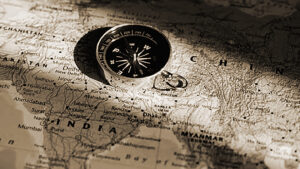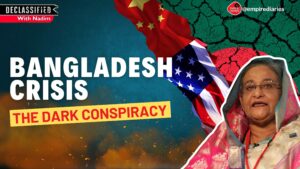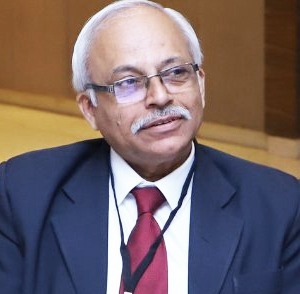Dr. Amitav Banerjee
COLUMN/ THE WRITE LINE
Bharat’s health minister Mansukh Mandaviya on June 9, 2023 tweeted an article titled: “One World One Health” – the catchphrase circulating across the globe these days. Well, we should be wary of slogans. Slogans are signs of authoritarianism. Slogans oversimplify complex issues, promote groupthink, and most crucially, discourage critical thinking. They become efficient tools of propaganda and mass hypnosis.
Reading the article ‘One World One Health’ beyond the title is rather disappointing. It is filled with jargon, including the newspeak “digital health”. It is full of technical words, disjointed, incomprehensible to the layperson, and confusing to the professional. Parts of it that are intelligible are disconcerting.
For example, the minister explains at length about Bharat’s “transformative digital tools” during the Covid-19 pandemic, which generated digital certificates as proof of vaccination. Does this not contradict the government’s affidavit in the Supreme Court stating that Covid vaccination was completely voluntary? Why the need for digital certificates as proof of vaccination if it was voluntary?
One World One Health 🌍 🏥
— Dr Mansukh Mandaviya (@mansukhmandviya) June 9, 2023
I write on how India can help #G20 make global healthcare a unified digital public good.
📰 https://t.co/RwicalBznI pic.twitter.com/zDei7r99Pu
Digital vaccine passports
The writing on the wall is ominous. The WHO (World Health Organisation) and the EU (European Union) are contemplating digital vaccine passports. The Covid-19 vaccine fiasco hasn’t dampened their zeal it seems. According to the WHO, it will be scaled up to a global digital health certificate. With the proposed Pandemic Treaty, the introduction of digital vaccine passports, and global digital health certificates, the ambition of the WHO to play the role of an extra-constitutional seat of power is becoming evident to all. Except perhaps to our health ministry.
The average reader will not comprehend much of the technicalities in the health minister’s writing nor its implications. On the contrary, the upwardly mobile laptop class will be impressed with the promise of technology and its applications to healthcare. Little will they realise that technology cannot address our basic deficiencies in public health infrastructure.
If there are no well-equipped public hospitals and public health centres, how will digital connectivity help? The technology will again be a boon to the laptop class covered by private health insurance-accessing corporate hospitals. Inequities in access to healthcare will increase.
The write-up ‘One World One Health’ ends with the Sanskrit phrase, “Vasudhaiva Kutumbakam,” meaning, the entire universe is one family. It’s a rather out-of-context use of a sacred saying.
‘One World One Health’ as a slogan
The article fails to elaborate on the title, “One World One Health.” It seems to be a cosmetic cover to the motley of technical jargons. The slogan echoes the message “No one is safe unless everyone is safe” – infamously propagated by the WHO during the Covid-19 pandemic.
According to the WHO’s own definition of health, “…health is a state…” that means it’s not static, be it at the individual level or population level. A person in perfect health today may be sick tomorrow, and vice versa. Their needs during perfect health would be different than their needs during sickness.
Similar fluctuations will be there at the population levels, across countries. Just as all individuals at a given time won’t have the same level of health (some may be healthy, while others may be sick and have different grades such as mild, moderate, or severely ill states), nations vary in their levels of health.
Not only health, the determinants of health such as per capita income, housing, population density, social inequalities, age structure, and various other known and unknown factors having a bearing on health will also differ across nations.
If we look from this perspective, ‘One World One Health’ is an oxymoron. It misses the finer nuances and diversities that determine the health of nations. Just to drive home the point, our country, like many other poor countries, is struggling with under-nutrition, a huge burden of communicable diseases that are far lethal than Covid, and overcrowding (which makes physical distancing impossible). Much of it is due to poor housing, poor sanitation, and air and water pollution.
The richer countries, on the other hand, are mainly struggling with diseases of affluence, such as obesity, and diseases among the elderly people. They have better housing, sanitation and water supply, low population density, and higher per capita income.
Epidemiology studies these differences, based on which interventions are customised for different regions and population groups. At a time when the WHO was still a credible source, at least partly, it had adopted the strategy, “Think Globally, Act Locally,” which made perfect sense epidemiologically.
George Orwell’s Nineteen Eighty-Four
The slogan, ‘One World One Health,’ implying one size fits all, breaches all epidemiological principles. It will put the poor countries at a disadvantage. Its paternalistic approach, bordering on authoritarianism with loss of autonomy of nations and human rights violations of citizens, is not compatible with a vibrant democracy such as Bharat. Digital health, digital identity and the use of technology for intrusive monitoring of common citizens on the pretext of health are reminiscent of George Orwell’s dark novel, Nineteen Eighty-Four.
Diversity among nations and cultures is what gives beauty to life and determines health in different ways across countries. It also preserves autonomy and the rights of citizens. One has to devise custom-made solutions to health problems in diverse situations. The ‘One World One Health’ concept will not fit all scenarios.
All chessboards have the same 64 squares and the same 32 chess pieces. But each game of chess is unique. Disease dynamics are far more complex than a game of chess. The ham-handed approach of ‘One World One Health’ could ruin human lives and enslave countries.
(Dr. Amitav Banerjee was a field epidemiologist for over two decades in the Indian Army. He led the mobile epidemic investigation team at the Armed Forces Medical College in Pune, India, from 2000-2004. During this period, he investigated a number of outbreaks in the country. He is presently a professor at a medical college in Pune and an academic editor at PLOS ONE journal.)
The column reflects the author’s opinions and not necessarily those of Empire Diaries.
REPUBLISHING TERMS:
All rights to this content are reserved. If you want to republish this content in any form, in part or in full, please contact us at writetoempirediaries@gmail.com.











